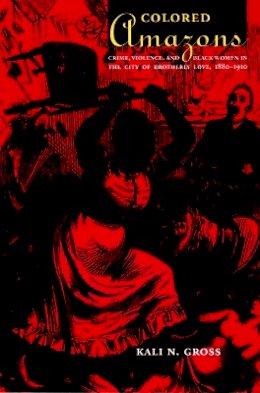Kali N. Gross is Assistant Professor of History and Director of Africana Studies at Drexel University.
“Heartfelt and bold, Colored Amazons stands confidently at the intersection of several kinds of history. Kali N. Gross has used statistics, scandal rags, and sophisticated modern studies to produce a genuinely innovative study of race and power, crime and sex, stereotypes and gender roles.”-Roger Lane, author of Roots of Violence in Black Philadelphia, 1860–1900 “In this high-spirited and original study, Kali N. Gross combines top-notch scholarship and a sense of the empowering potential of history as she mines previously untapped sources to understand black women’s crimes in Philadelphia in the period 1880–1910. She tells the story of how race, gender, and sexuality shaped criminal justice, criminology, and urban reform movements while she also explores how black women negotiated with the justice systems they encountered. Gross addresses topics other scholars have avoided, including these women’s experiences of abuse and their own acts of violence, to produce a story that is at once painful, moving, and inspiring.”-Nicole Hahn Rafter, author of Partial Justice: Women in State Prisons, 1800–1935 “Much has been made in media reports about the fact that African American women are the fastest growing population in today’s jails and prisons. If you have ever wondered about the historical roots of this trend, Colored Amazons is an excellent place to start. Kali N. Gross approaches her subjects with sensitivity without being sentimental as she unravels the complexities of poor women as agents and as victims negotiating survival and bouts with the law. This is a must read for all who want to understand the criminal justice system, women inmates, and the evolving social structure that locks them out and locks them up.”-Tera W. Hunter, author of To ’Joy My Freedom: Southern Black Women’s Lives and Labors after the Civil War “Through an examination of black women engaged in both property and violent crime in the context of political, social, and economic disfranchisement, Kali N. Gross has produced a riveting narrative that reveals the ways in which criminal acts and courtroom and prison behavior were also expressive acts. She not only contributes profoundly to our understanding of black working-class and poor women in and around turn-of-the century Philadelphia but also resists the tendency to romanticize these women as ‘primitive rebels.’ The work is truly pathbreaking.”-Robin D. G. Kelley, author of Freedom Dreams: The Black Radical Imagination “Colored Amazons is a rigorously researched and lively written account of Black women’s circulation through Philadelphia’s criminal justice system in the decades after Reconstruction and offers a compelling history of punishment and of the evolution of racism at the turn of the twentieth century. . . . It would be a wonderful addition to courses on Black women’s history, urban studies, or penal studies.” - Courtney Denine Marshall (Women's Studies) “[A] must read for those wishing to fully investigate the inner workings of freedom and justice in America. Colored Amazons serves the important purpose of suggesting how much more we have to learn from the way crime and criminalization operate in society. Gross has demonstrated the power of crime as a social prism, and Colored Amazons will both inform and inspire scholars.” - Shawn Leigh Alexander (Journal of American History) “Gross’s innovative work is exceptional for its position in the historiography of black women’s history, brilliant use of source material, and noble application of social history. . . . Colored Amazons is not only for academic audiences but also for public policy analysts, legal professionals, and people who are interested in understanding how the complexities of race, gender, and class affect America’s ideology on crime and prison reform. . . . A remarkable study.” - Sylvea Hollis (H-Net Reviews) “Gross's book provides historians with a spirited account of black women's criminality in Philadelphia during the Progressive era.” - Anne Meis Knupfer (American Historical Review) “In this deeply researched account of fin-de-si`ecle Philadelphia, Kali Gross combines social and cultural history. . . . Gross’s arguments are enhanced in the detailed compilation and analysis of arrest, conviction and prison records, especially those from Eastern State Penitentiary. She has mined the tedious, but rich material found in the convict registers, warden’s journals and prison docket books of the most important sites of incarceration to draw a nuanced profile of black female criminality.” - Timothy J. Gilfoyle (Gender & History) “Readers will agree that this book is a valuable contribution to the dialectic surrounding history, politics, and culture. . . . This book will be of interest to persons seeking to understand the impact of the criminal justice system on female inmates, and offers potential remedies for the disproportionate rate of black female incarceration. . . . Kali Gross has presented a well-researched and carefully argued investigation of female criminality.” - Floris Barnett Cash (Journal of African American History) "Gross writes with passion and sensitivity about a particularly oppressed group of women in nineteenth century Philadelphia. She is to be congratulated for having the courage to apply her considerable talents to a very sensitive subject. . . ." - David R. Johnson (Journal of Social History)

